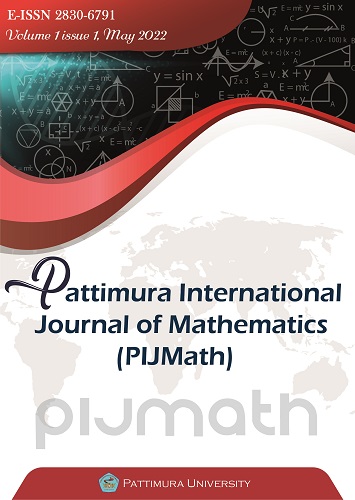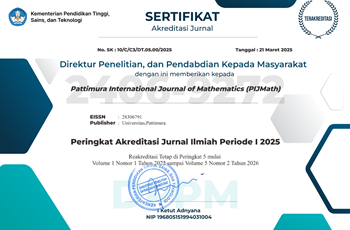Analysis of Online Learning During the Covid-19 Period using the Ordinary Least Square (OLS) Method
Abstract
Education is the main capital to create quality human resources to face the challenges of the times that continue to develop rapidly. At the end of 2019, Indonesia experienced an outbreak of the COVID-19 pandemic. It makes learning activities carried out from home or online. Online learning aims to meet educational standards by utilizing information technology using a computer or mobile devices that are interconnected between students and teachers via an internet connection. However, there are several problems in the online learning process, both among teachers and students, as well as the facilities used in learning. The method of least squares (Ordinary Least Square) is one of the estimation methods used to analyze the relationship between the predictor variable (independent variable) and the response variable (dependent variable). This study aimed to identify and analyze online learning problems during the covid-19 pandemic. The data used in this study were sourced from Public Senior High School 11 Ambon, with the variables used being learning motivation (X1), teacher's role (X2), and student learning outcomes (Y). This study concluded that student learning outcomes in online learning at Public Senior High School 11 Ambon were in a low category, student motivation in learning is in the moderate category, and the role of the teacher is in the moderate category. In addition, the variables of learning motivation and the role of the teacher together have a positive effect on student learning outcomes. The amount of the contribution of the influence of learning motivation and the role of the teacher to student learning outcomes at Public Senior High School 11 Ambon is 61.9%, while other factors outside the study influence the remaining 38.1%.
Downloads
References
Suriadi, H. J., Firman, F., & Ahmad, R. (2021). Analisis Problema Pembelajaran Daring Terhadap Pendidikan Karakter Peserta Didik [Analysis of Online Learning Problems on Character Education of Students]. Edukatif: Jurnal Ilmu Pendidikan, 3(1), 165-173.
Kemenkes, R. I. (2020). Vaksin Covid-19 Belum Ditemukan, Pemerintah Siapkan Skenario New Normal [Covid-19 Vaccine Has Not Been Found, Government Prepares New Normal Scenario]. Kemenkes. Go. Id.
Juliya, M., & Herlambang, Y. T. (2021). Analisis problematika pembelajaran daring dan pengaruhnya terhadap motivasi belajar siswa [Analysis of online learning problems and their effect on student learning motivation]. Genta mulia: jurnal ilmiah pendidikan, 12(1), 281-294.
Yunitasari, R., & Hanifah, U. (2020). Pengaruh pembelajaran daring terhadap minat belajar siswa pada masa covid 19 [The effect of online learning on student interest in learning during the covid 19 period]. Edukatif: Jurnal Ilmu Pendidikan, 2(3), 232-243.
Oktavian, R., & Aldya, R. F. (2020). Efektivitas pembelajaran daring terintegrasi di era pendidikan 4.0 [the effectiveness of integrated online learning in the 4.0 education era]. Didaktis: Jurnal Pendidikan dan Ilmu Pengetahuan, 20(2).
Jamaluddin, D., Ratnasih, T., Gunawan, H., & Paujiah, E. (2020). Pembelajaran daring masa pandemik Covid-19 pada calon guru: hambatan, solusi dan proyeksi [Online learning during the Covid-19 pandemic for prospective teachers: obstacles, solutions and projections]. LP2M.
Wahyono, P., Husamah, H., & Budi, A. S. (2020). Guru profesional di masa pandemi COVID-19: Review implementasi, tantangan, dan solusi pembelajaran daring [Professional teachers during the COVID-19 pandemic: Review of online learning implementations, challenges, and solutions]. Jurnal pendidikan profesi guru, 1(1), 51-65.
Rosita, L. (2018). Peran pendidikan berbasis karakter dalam pencapaian tujuan pembelajaran di sekolah [The role of character-based education in achieving learning goals in schools]. JIPSI-Jurnal Ilmu Politik dan Komunikasi UNIKOM, 8.
Tumurun, S. W., Gusrayani, D., & Jayadinata, A. K. (2016). Pengaruh model pembelajaran discovery learning terhadap keterampilan berpikir kreatif siswa pada materi sifat-sifat cahaya [The effect of discovery learning learning model on students' creative thinking skills on the material properties of light]. Jurnal Pena Ilmiah, 1(1), 101-110.
Lestari, S. N. A. P. A., Jayadinata, A. K., & Aeni, A. N. (2017). Meningkatkan keterampilan proses sains siswa pada materi sifat-sifat cahaya melalui pembelajaran inkuiri [Improving students' science process skills on the material properties of light through inquiry learning]. Jurnal Pena Ilmiah, 2(1), 621-630.
Hidayat, R. (2018). Perancangan fasilitas perancangan pelatihan seni bela diri pencak silat dimalang [Planning of facilities for planning pencak silat martial arts training in Malang] (Doctoral dissertation, UNIVERSITAS 17 AGUSTUS 1945).
Juliya, M., & Herlambang, Y. T. (2021). Analisis problematika pembelajaran daring dan pengaruhnya terhadap motivasi belajar siswa [Analysis of online learning problems and their effect on student learning motivation]. Genta mulia: jurnal ilmiah pendidikan, 12(1), 281-294.
Rigianti, H. A. (2020). Kendala pembelajaran daring guru sekolah dasar di Banjarnegara [Barriers to online learning for elementary school teachers in Banjarnegara]. Elementary School: Jurnal Pendidikan dan Pembelajaran ke-SD-an, 7(2).
Syahputra, I. D., & Karim, A. (2017). Perbandingan Metode Ordinary Least Square (OLS) dan Regresi Robust [Comparison of Ordinary Least Square (OLS) and Robus Regression Methods]. In Prosiding Seminar Nasional & Internasional.
Rosanti, L., & Matdoan, M. Y. (2022). Penerapan Regresi Linier Berganda Untuk Mengetahui Pengaruh Kinerja Dosen dan Motivasi Belajar Terhadap IPS Mahasiswa dalam Pembelajaran Daring [Application of Multiple Linear Regression to Determine the Effect of Lecturer Performance and Learning Motivation on Student Social Studies in Online Learning]. PARAMETER: Jurnal Matematika, Statistika dan Terapannya, 1(2), 68-78.
The author(s) hold the copyright of the published article without restriction. This policy means that the journal allows the author(s) to hold and retain publishing rights without restrictions.
The author(s) holds the copyright of published articles without limitation. This policy means that the journal allows the author to hold and retain publishing rights without restrictions. Journal editors are given the copyright to publish articles in according to agreement signed by the author and also include statement of originality of the article


.jpg)












 This work is licensed under a
This work is licensed under a 